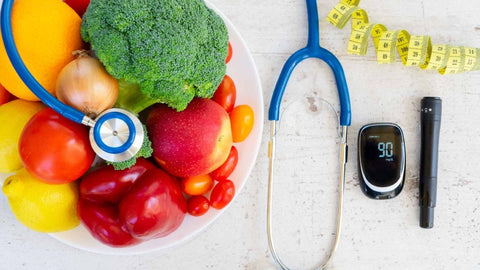More than 37 million Americans have been diagnosed with diabetes and more than 90 percent have type 2 diabetes. Type 2 diabetes is one of the top 10 causes of death and the number 1 cause of hormonal disorders in the US. In 2017 studies show that over 462 million people in the world were affected by Type 2 diabetes. This growing worldwide epidemic affects individuals of all socioeconomic backgrounds and although found mostly in adults over the age of 45 it is now increasingly being diagnosed in younger groups. The rising number of this disease is vast because of the increased consumption of an unhealthy diet also known as a nutrient-poor diet. In this article we’ll discuss the necessary changes to prevent, manage, and aid in treating type 2 diabetes.
 What is Type 2 Diabetes?
What is Type 2 Diabetes?

Type 2 diabetes is the presence of an excess amount of sugar in the bloodstream because of loss of sensitivity to insulin otherwise known as insulin resistance. Insulin is a hormone used to regulate and maintain proper blood sugar levels in the body. In the early stages of type 2 diabetes, an increased amount of insulin is secreted to metabolize the surplus of sugar in the body, gradually the body is unable to produce enough insulin to keep up with the amount of sugar in the bloodstream. The ongoing excessive amounts of sugar or inability to metabolize it results in a cascade of chronic disorders (i.e. kidney disease, nerve damage, and more).
Obesity, poor nutrient diet, lifestyle, and genetics are major risk factors for the development of type 2 diabetes. A sedentary lifestyle, chronic stress, unhealthy gut, lack of sleep, and toxins also contribute to this disease process.
Basic Science You Should Know to Successfully Manage and Treat Type 2 Diabetes
To successfully manage Type 2 Diabetes, it’s crucial to have a basic understanding of the science behind blood sugar. Carbohydrates are metabolized into monosaccharides. Glucose is one of the monosaccharides, that is absorbed into the bloodstream from the digestive tract and carried into our cells via insulin. As mentioned before, high blood sugar in the bloodstream is the result of cells gradually becoming insensitive to insulin. Therefore, it is important to measure blood sugar to manage and monitor the progression of this disease. The most common tests used to measure blood glucose are, fasting blood glucose, oral glucose, and hemoglobin A1c.
8 Things You Should Do Today If You Have Type 2 Diabetes

1. Change Your Diet
A healthy diet is crucial in managing Type 2 diabetes. Your body needs the right nutrients to maintain blood sugar levels and avoid complications.
-
Foods to Avoid:
-
Grains (pasta, bread, cereals): These foods are high in carbohydrates and can cause blood sugar spikes.
-
Snack Foods (processed baked goods, candy, cookies, crackers): These tend to be loaded with refined sugars and fats, which can exacerbate blood sugar fluctuations.
-
Sugar-Sweetened Beverages (soda, juices, sports drinks): These drinks are packed with sugar, which raises blood sugar rapidly.
-
Legumes (lentils, beans): While generally healthy, legumes are high in carbohydrates and may cause blood sugar spikes in some people.
-
Starchy Vegetables (potatoes, yams, corn): These vegetables are high in starch, which turns into glucose and can increase blood sugar levels.
-
Refined Sugars and High-Carb Foods: Any processed food rich in refined sugars and high glycemic index foods can lead to uncontrolled blood sugar levels.
-
Foods to Add:
-
Blueberries: Packed with antioxidants, they help reduce inflammation, which can improve insulin sensitivity and sugar uptake.
-
Olive Oil: Rich in healthy fats, it can help reduce hemoglobin A1c (a long-term marker of blood sugar levels) and fasting blood glucose.
-
Seafood: Particularly fatty fish like salmon, sardines, and mackerel, help reduce A1c, lower bad cholesterol, and maintain healthy blood sugar levels.
-
Cacao: Dark chocolate with at least 70% cocoa contains flavonoids that promote vasodilation, improving blood circulation and enhancing sugar uptake by cells.
-
Fermented Foods: These foods, including yogurt, kefir, kimchi, and sauerkraut, promote a healthy gut microbiome, which helps regulate glucose metabolism.
-
Nuts and Seeds: High in healthy fats, fiber, and protein, these foods reduce blood pressure and help stabilize blood sugar. Examples include chia seeds, almonds, walnuts, and flaxseeds.
2. Add Essential Supplements
In addition to food, certain supplements can play a crucial role in managing Type 2 diabetes.
-
Vitamin D: This vitamin improves insulin sensitivity, which is essential in managing blood sugar levels. People with diabetes often have low levels of vitamin D, so supplementation may be beneficial.
-
B12 and Folate: If you’re on medications like metformin, it can deplete your body’s B12 and folate levels, leading to deficiencies. Supplementing these vitamins helps prevent nerve damage and other complications.
-
Magnesium: Low magnesium levels have been linked to insulin resistance. Magnesium supplementation helps regulate blood sugar by improving insulin sensitivity.
3. Exercise Regularly

Regular physical activity is one of the most effective ways to manage Type 2 diabetes. Exercise helps your body use insulin more effectively and lowers blood sugar levels.
-
Cardiovascular Exercise: Activities like walking, cycling, or swimming help burn calories, lower blood sugar, and reduce the risk of heart disease (which is common in diabetics).
-
Strength Training: Resistance exercises like lifting weights increase muscle mass, which helps improve insulin sensitivity and better blood sugar control.
-
Aim for 150 Minutes of Moderate Exercise Per Week: The American Diabetes Association recommends a combination of aerobic exercise and strength training. This helps regulate glucose levels and can reduce A1c by up to 0.5%.
4. Talk with Your Doctor and Nutrition Specialist
Diabetes management is highly individualized. Working closely with a healthcare team can help tailor a plan that works best for your unique needs.
-
Doctor Consultation: Your doctor can help adjust your diabetes medications as you make changes to your lifestyle. Regular check-ups are necessary to monitor blood sugar levels, kidney function, and any complications that may arise.
-
Nutrition Specialist: A registered dietitian can help you create a personalized meal plan based on your preferences, lifestyle, and blood sugar targets. This ensures you’re eating foods that improve your health without compromising blood sugar control.
-
Medication Adjustments: If you’re making significant changes to your diet or exercise routine, it’s essential to check in with your doctor to avoid extreme fluctuations in blood sugar.
5. Prioritize Quality Sleep
Sleep plays a vital role in regulating blood sugar and insulin sensitivity.
-
Why Sleep Matters: Poor sleep or sleep deprivation increases cortisol (the stress hormone), which raises blood sugar levels. A lack of sleep also affects how your body metabolizes glucose.
-
Aim for 7-9 Hours of Sleep: Consistent, high-quality sleep helps regulate hormones, including those that control hunger and glucose metabolism. Prioritize a good sleep routine by limiting screen time before bed, avoiding caffeine late in the day, and creating a relaxing environment.
-
Better Sleep, Better Blood Sugar: Improving sleep hygiene can lead to better blood sugar control and help reduce the risk of complications from diabetes.
6. Manage Stress Effectively

Chronic stress can wreak havoc on blood sugar levels and overall health.
-
How Stress Affects Blood Sugar: Stress triggers the release of hormones like cortisol and adrenaline, which raise blood sugar. Over time, chronic stress can lead to insulin resistance and elevated glucose levels.
-
Stress-Reducing Practices:
-
Meditation: Regular meditation reduces stress and promotes relaxation, helping lower blood sugar levels.
-
Deep Breathing: Practices like diaphragmatic breathing activate the parasympathetic nervous system, which helps counteract stress and lower blood sugar.
-
Yoga: Yoga combines physical movement and breathwork, reducing stress and improving insulin sensitivity.
-
Mindfulness: Paying attention to the present moment can lower stress hormones and improve overall well-being.
7. Monitor Blood Sugar Regularly
Regular monitoring is critical to understanding how food, activity, and medication affect your blood glucose levels.
-
At-Home Monitoring: Using a glucometer allows you to track your blood sugar levels at different times of the day, especially after meals or exercise. This helps you make adjustments to your lifestyle.
-
Work with Your Doctor: Your healthcare provider will recommend how often you should check your blood sugar levels. Common tests include fasting blood glucose, oral glucose tolerance tests, and hemoglobin A1c, which reflects your average blood sugar over the past 2-3 months.
-
Continuous Glucose Monitors (CGMs): For more frequent tracking, a CGM can provide real-time data on your blood sugar levels throughout the day and night.
8. Stay Hydrated
Staying hydrated is crucial for overall health and managing diabetes.
-
Water Helps Control Blood Sugar: Drinking enough water helps flush excess glucose through urine and keeps your kidneys functioning properly. It also prevents dehydration, which can lead to higher blood sugar levels.
-
Avoid Sugary Drinks: Replace soda, juices, and sweetened beverages with water, herbal teas, or water-infused with fresh fruits or herbs.
-
Hydration Tips: Aim to drink 8-10 glasses of water per day. More may be needed if you exercise, are in hot weather, or have certain health conditions.
Talk with your Doctor and Nutrition Specialist
 If you have diabetes, it’s important to work closely with a doctor and nutrition specialist to find the best diabetic diet for you. You should also consult with them before making any changes to your current diet or adding supplements as it may affect current diabetes medication. This is to prevent sudden and dramatic drops in blood sugar.
If you have diabetes, it’s important to work closely with a doctor and nutrition specialist to find the best diabetic diet for you. You should also consult with them before making any changes to your current diet or adding supplements as it may affect current diabetes medication. This is to prevent sudden and dramatic drops in blood sugar.
In Conclusion
Type 2 Diabetes affects one-tenth of Americans and can lead to long-term damages resulting in death. It is a disease that develops gradually, and early detection can not only prevent complications but reverse diagnosis. Dietary and lifestyle modifications can eliminate major risk factors like obesity, poor nutrition, and oxidative stress. There are a variety of foods that can be added to replace the necessary foods that need to be removed for the proper treatment of Type 2 diabetes. Consult with your doctor/nutritionist before making dietary changes as this may require modification in medication dosages.


.png?v=1737390083)
.png?v=1737187409)

